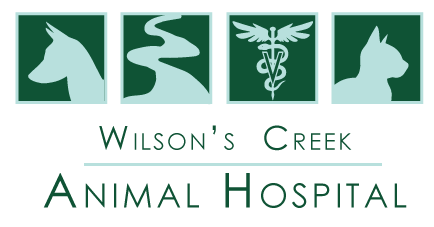|

What You Need to Know Before Your Pet's Surgery
Many people have questions about their pet's surgery, and we hope this information will help answer your questions. It also explains the decisions you will need to make before your pet's upcoming surgery.
Is the anesthesia safe?
Modern anesthetic agents have made surgery much safer than in the past.
Here at Wilson's Creek Animal Hospital, we do a thorough physical exam on your pet before administering anesthetics, to ensure that a fever or other illness won't be a problem. We also adjust the amount and type of anesthetics used depending on the health of your pet.
Preanesthetic blood testing is important in reducing the risk of anesthesia. Every pet should have blood testing before surgery to ensure that the anesthetic can be safely administered. Even apparently healthy animals can have serious organ system problems that cannot be detected without blood testing. If there is a problem, it is much better to find it before it causes anesthetic or surgical complications. If serious problems are detected, surgery can be postponed until the problem is corrected.
For geriatric or ill pets, additional blood tests, electrocardiograms, or x-rays may be required before surgery as well.
It is important that surgery be done on an empty stomach to reduce the risk of vomiting during and after anesthesia. You will need to withhold food for at least 8 to 10 hours before surgery. Water can be left down for the pet until the morning of surgery.
Will my pet have stitches?
For many surgeries, we use absorbable sutures underneath the skin and skin glue on the outside. These will dissolve on their own, and do not need to be removed later. Some surgeries, especially tumor removals, do require skin sutures or staples. With either type of suture, you will need to keep an eye on the incision for swelling or discharge. Most dogs and cats will lick or chew at the incision, so you will need to watch for this. If there are skin sutures/staples, they will need to stay in for 10 to 14 days after surgery. You will also need to limit your pet's activity level for a time and no baths are allowed until the sutures are removed.
Will my pet be in pain?
Anything that causes pain in people can be expected to cause pain in animals. Pets may not show the same symptoms of pain as people do; they usually don't whine or cry, but you can be sure they feel it. Pain medications needed will depend on the surgery performed. Major procedures require more pain relief than things like minor lacerations.
For dogs, we use an NSAID, and if needed, a second pain medication.
Because cats do not tolerate standard pain medications such as aspirin, ibuprofen, or Tylenol, we do not give them. Fortunately, we have several very good alternatives. Either buprenorphine, tramadol, or gabapentin are used for pain relief in cats. These are all safe, effective means of pain control for our felines.
The cost will depend on the size of the dog or cat. Fortunately, the pain medications are both inexpensive, and available in a generic form.
Providing whatever pain relief is appropriate is a humane and caring thing to do for your pet.
What other decisions do I need to make?
While your pet is under anesthesia, we may be able to perform other minor procedures, such as dentistry, ear cleaning, or implanting an identification microchip. If you would like an estimate for these extra services, please call ahead of time. This is especially important if the person dropping the pet off for surgery is not the primary decision maker for the pet's care.
When you bring your pet in for surgery, we will need to 5 to 10 minutes of time to fill out paperwork. When you pick up your pet after surgery you can also plan to spend about 5-10 minutes to go over your pet's home care needs.
We will call you 1-2 days before your scheduled surgery appointment, to confirm the time you will be dropping your pet off and to answer any questions you might have. In the meantime, please don't hesitate to call us with any questions about your pet's health or surgery.
|